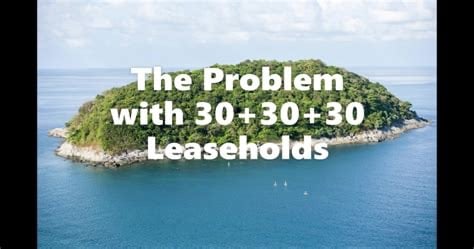Navigating Thailand's Laws on 30-Year Leases for Foreigners
Thailand’s tropical allure attracts many foreigners seeking to invest in property, either as a vacation home, a retirement haven, or an investment opportunity. However, Thai property laws place significant restrictions on foreign ownership of land and houses, making 30-year leases a popular alternative.
Author: Mark Kreitzman - over 20 years experience investing in Thailand real estate, crypto/blockchain and cybersecurity expert
6/4/20242 min read


Navigating Thailand's Laws on 30-Year Leases for Foreigners
Thailand’s tropical allure attracts many foreigners seeking to invest in property, either as a vacation home, a retirement haven, or an investment opportunity. However, Thai property laws place significant restrictions on foreign ownership of land and houses, making 30-year leases a popular alternative. Understanding the legal framework around these leases is crucial for foreigners looking to secure property in Thailand.
Legal Framework for Foreigners
Under Thai law, foreigners are generally prohibited from owning land. However, they can legally lease land and houses for up to 30 years, with the possibility of renewal. This leasehold arrangement offers a practical solution for foreigners wishing to reside in Thailand long-term without contravening ownership restrictions.
30-Year Lease Agreements
Structure and Terms: A 30-year lease must be a formal, written agreement signed by both parties and registered with the local land office to be legally binding. The lease agreement can specify terms such as the purpose of the lease, the lease period, rental payment details, and conditions for renewal.
Renewal Clauses: While a lease can include a clause allowing for a renewal for an additional 30 years, it is important to note that renewals are not automatically guaranteed. The renewal is subject to mutual agreement and the lessor’s willingness to extend the lease. Some agreements might also specify a third 30-year term, potentially extending the leasehold up to 90 years in total, but each extension must be treated as a separate agreement. Keep in mind, there is no legal protection if the landlord does not want to extend the lease.
Rights and Restrictions: Lessees have the right to occupy and use the property for the duration of the lease but do not have ownership rights. They cannot sell the property but can sublease it or transfer the lease to another party, subject to the lessor’s consent.
Advantages and Considerations
Stability and Security: A registered 30-year lease provides long-term stability and security for foreigners, allowing them to reside in Thailand without worrying about short-term rental agreements.
Investment Opportunity: Leasing property in prime locations can be a lucrative investment, particularly in popular tourist or expatriate areas.
Legal Protections: Thai law provides protections for lessees, ensuring that the lease terms are honored and that lessees have legal recourse in case of disputes.
Key Considerations
Legal Assistance: It is advisable to seek legal assistance when drafting and registering a lease agreement to ensure compliance with Thai laws and to protect one’s interests.
Due Diligence: Conduct thorough due diligence on the property and the lessor to avoid potential issues such as unclear land titles or legal disputes.
Understanding Terms: Ensure a clear understanding of the lease terms, including renewal conditions and any restrictions on the use of the property.
Conclusion
The 30-year lease option offers a viable pathway for foreigners to secure property in Thailand, providing long-term stability and the potential for renewal. By adhering to legal requirements and conducting due diligence, foreigners can enjoy the benefits of leasing property in this beautiful country while navigating its regulatory landscape effectively.
